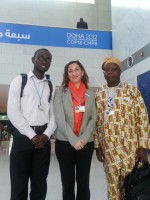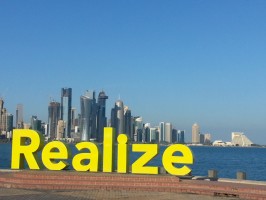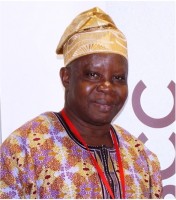This article originally appeared in the Science for Peace Bulletin, Fall 2011
Introduction
For nearly 20 years the United Nations Framework Convention on Climate Change has been the international body responsible for addressing the global problem of climate change. In 1990, the UN General Assembly passed a resolution formally launching negotiations towards an international climate change agreement and, on May 9, 1992, the United Nation Framework Convention on Climate Change (UNFCCC) was adopted (IPIECA, 2008: 2). Currently, the Convention has been signed by 191 nations. Historically, the United Nations has been the highest decision making body that nations turn to in order to come to an agreement on how to reduce global greenhouse gas (GHG) emissions. At the core of the UNFCCC process is the ideal of international cooperation and democratic pluralism leading to collective action to solve the problem of climate change. The UNFCCC represents and forwards the widely held belief that cooperation among interested parties, including states, corporations, and civil society, can result in policies to resolve global warming. The annual Conference of the Parties (COP) serves as a space for nations to evaluate, negotiate, and improve their commitments within the Convention.
However, for several years now, the UNFCCC and its annual COP have come under severe criticism. First of all, the on-going political negotiations of the UNFCCC have not moved the world closer to resolving the problem of climate change despite growing scientific evidence of the serious risks to ecosystems and society. In fact, since the beginning of the Convention, the mean global concentration of CO2 has actually increased from 356.27 ppm in 1992 to 389.78 ppm in 2010 (Mauna Loa Observatory), calling into question the capacity of the UNFCCC and the Kyoto Protocol to actually curb and reduce emissions. Secondly, the Conference of the Parties 15 (COP15) in Copenhagen was a turning point in the legitimacy of the UNFCCC insofar as the façade of democratic pluralism (which its legitimacy relies upon) was officially shredded. Over 30,000 official delegates were locked out of the COP15 negotiations and found themselves confronted by police brutality while the Copenhagen Accord was put forward by a handful of states without the support of the G77. The failure of leading industrial nations to be inclusive or deliberative in the face of a major threat to the survival of the human race led many experts and observers to concede that the UNFCCC process is unlikely to provide any meaningful action on curbing GHG emissions. Thirdly, in the last round of negotiations at COP16 in Cancun, the international community agreed to maintain a global temperature rise of 2°C, while suggesting that the controversial Carbon Capture and Storage and REDD+ (reduced emissions through decreased deforestation) schemes should form a new market-based solution to curbing emissions, while also putting forward a new Green Fund for mitigation and adaptation actions for developing countries. Despite the the UNFCCC’s rush to promote these decisions as ‘progress’, Cancun failed to fulfill the central purpose of the UNFCCC which is to establish a legally binding commitment to reduce emissions between countries.
Civil Society and the UNFCCC
From a political perspective, one of the most alarming features of the UNFCCC currently has been its reconfigured relationship to civil society which began in 2009. At COP15, 45,000 official delegates arrived at the conference to participate as official invited observers. This historical turnout proved to be a serious challenge for the United Nations. Logistically, the conference site could hold only 15,000 people, leaving 30,000 delegates stranded outside for days on end. Outraged over their exclusion, NGO delegates protested and joined a climate justice street march. The protestors were confronted with 9,000 police officers who used brutality and arbitrary arrest to dissipate the peaceful march. Amid the chaos, the president of the UNFCCC resigned and the UNFCCC unilaterally decided to formally lock out all 15,000 NGO delegates from COP15 leaving decisions to the state and corporate delegates who were locked behind closed doors. Thousands of invited participants were officially blocked from the multilateral climate process, marking the end of open NGO participation within the UNFCCC.
Reviewing the situation, the UNFCCC realized that civil society was willing to mobilize in large numbers to express its discontent with the UNFCCC process and the failure of democratically elected governments to represent the concerns of citizens. In order to reclaim its legitimacy at COP16 in Cancun, the UNFCCC made a number of strategic manoeuvres. In the first place, the conference was relocated to the Yucatan Peninsula, far away from major population centers. Cancun provided a strategic spatial fix for the UNFCCC insofar as the protests that did inevitably occur in Mexico City had no key location upon which to converge. Secondly, for the first time in its history, the UNFCCC decided to physically separate official NGOs and non-delegate civil society from the negotiation space of the conference. Overall, the conference zone was so large that it would have taken seven hours to traverse the entire zone by foot and just over two hours to traverse the zone by car or bus, a calculation that does not include the delays caused by military checkpoints along the way. In contrast, in Copenhagen the conference was located in one space and was easily accessible by anyone via public transit. This effectively erased all civil society from the space of the official negotiations. Finally, the choice of Cancun also afforded UNFCCC COP16 delegates the opportunity to attend the conference in an idyllic location offering the eco-vacation of a lifetime. To this end, Cancun was transformed into an environmental fantasyland where delegates, who were secured accommodations in all inclusive ‘eco-resorts’, could purchase carbon offsets to ensure their flight to the COP was carbon neutral, wake up to the sounds of pre-recorded birds singing in a transplanted ‘conservation’ forest, gorge on all-you-can-eat daily vegan, and ‘get back to nature’ in their downtime by taking various eco-trips into artificial conservation areas along the peninsula. These actions on the part of the UNFCCC served to re-legitimate the organization in the eyes of delegates, and set forward a new precedent to physically remove civil society from the spaces of power in international climate politics.
The Road to Durban COP17
COP17 will take place in Durban from November 28 – December 9 2011. As we approach the eve of another COP, what can we expect in light of the UNFCCC’s recent history and the outcomes of the interim talks in Bonn since Cancun? In a nutshell, we can expect to witness the end of the Kyoto Protocol with no new legally binding commitments to reduce greenhouse gas emissions to replace it. The failure of the interim negotiations in Bonn last June to produce a draft for negotiation in Durban is a telling sign that the international process to reduce emissions via a legal agreement is unlikely to move forward in the near term, and instead we should expect to see international efforts diverted towards financing and establishing the basis, implementation, and details of the $100 billion per year Green Fund for developing countries by 2020. But, the Green Fund, in the absence of new legally-binding emission reduction targets, will act to divert attention away from the main emitters of GHGs. Instead, the international community’s attention will be placed on technology transfers to the South rather than on substantive cuts for the world’s major emitters, establishing the legally controversial REDD+ scheme, and encouraging new forms of experimental adaptation finance- none of which will achieve the immediate and pressing goals of reducing global GHG emissions to curb catastrophic climate change. Patrick Bond, has described the situation poignantly: “What everyone now predicts is a conference of paralysis. Not only will the Kyoto Protocol be allowed to expire at the end of its first commitment period (2012). Far worse, Durban will primarily be a conference of profiteers, as carbon trading – the privatization of the air, giving rich states and companies the property-right to pollute – is cemented as the foundation of the next decade’s global climate malgovernance” (Bond, 2011: 1). This is evident as the UNFCCC recently called for a ‘quantum leap’ in private sector involvement in investment to combat climate change this September (Chestney and Twidale, 2011). The power of corporate interests in the negotiations has been a prominent feature of the UNFCCC since the implementation of the Kyoto Protocol, and the force of market interests is evident in the push forward towards REDD+. Moreover, some elements of civil society appear to be shifting, with Greenpeace announcing a change in its strategic focus, choosing to focus less on the UNFCCC negotiations and more on action against industrial polluter and corporations. To date, the activities of civil society and the climate justice movement for mobilizing action at COP17 appear fragmented, and although it is difficult to predict the future, the location of COP17 in the wealthy guarded neighbourhoods of Durban raises questions regarding the capacity of civil society to adequately impact the process through traditional forms of protest and mass mobilization. In all likelihood, political activism at COP17 is likely to remain outside of the purview of the negotiators and power, as a market-based agenda is pushed forward and entrenched deeper into the UNFCCC and its various non-binding agreements.
Developing a Radical Climate Politics
Currently, it appears that previous modes of pressure by civil society have not been able to stop the UNFCCC from putting forward market-based solutions to climate change that privilege economic and corporate interests. Calls for a fair and just climate deal have fallen on deaf ears for nearly two decades, with no change in sight. Moreover, we find ourselves at a moment where the summer Arctic ice extent has reached a record low, where East Africa is experiencing its worst drought in 60 years, and where Texas had the worst wildfires in its history. Yet, these trends which should alarm all of us to the potential devastating consequence of climate change for humans and nature, have been met with further equivoaction by the corporate state and the power elite who claim that the market can solve this unprecedented environmental problem, and even that climate change will bring new unforeseen benefits and an age of “climate prosperity” (NRTEE, 2010). Sheldon Wolin would explain these politics as shaped by the inverted totalitarianism that has been normalized in US and international politics. Unlike classic totalitarianism, where a powerful state dominates the economy, in inverted totalitarianism corporations and the economic imperatives dominate the state. According to Chris Hedges, climate change is inseparable from inverted totalitarianism, and the failure of the liberal class who have placed their hopes in the climate negotiations is that it “sought consensus and was obedient when it should have fought back. (It) continues to trumpet a childish faith in human progress.....the naive belief that technology will save us from ourselves. The liberal class assumed that by working with corporate power, it could mitigate the worst excesses of capitalism and environmental degradation. It did not grasp, perhaps because liberals do not read enough Marx, the revolutionary and self-destructive nature of unfettered capitalism” (Stryker, 2010 quoting Hedges, 2010). We have failed as a society to address the problem of climate change through our existing political mechanisms and economic structure. For example, the current Canadian government’s tendency to privilege corporate and economic interests at the climate negotiations and its continued support of the Tar Sands is exemplary of the inverted totalitarianism under which we now live. Given the clear directive of the Harper government to ignore the overwhelming majority of Canadian voices (65%) that believe the government should take action on climate change at home (CBC, 2011), and by extension, the inaction of our government at the UNFCCC negotiations, suggests that we should seriously re-evaluate what citizens can accomplish through protest or representative politics. Notwithstanding a major change in government direction after the next election, it may be time to reconsider the shape that climate politics ought to take. It may be time to put aside our hopes that the UNFCCC and negotiations among the power elite can solve the problem. Instead, we should consider preparing for the changes to come as our governments, institutions, and economic structures fail to take the actions necessary to halt climate change. A radical politics of climate change will not be found in a protest march barricaded by police on the outskirts of a dying UNFCCC negotiation in Durban. Radical action on climate change will happen in our communities and among us. At the most basic level, this will include building communities that do not depend on oil for the basis of their survival, a move towards self-sufficient self-governing sustainable democratic communities capable of providing for their material needs outside of capitalist social relations, developing the capacity to grow food outside of the agro-industrial complex, developing economically democratic systems for production, reclaiming the commons that are fundamental to human survival , and above all a fundamental change in consciousness where the human domination of nature, the human domination of other humans, and the human domination of the self no longer forms the basis of our social relations.
Sources
Bond, P. (2011). ‘The Durban Climate Summit (Conference of the Parties 17) Climate Justice versus Market Narratives’, Nature™ Inc. Questioning the Market Panacea in Environmental Policy and Conservation, Institute for Social Studies, The Hague, 30 June 2011
CBC (2011). ‘Climate Change an Issue in Canada: Poll’, CBC News Online, February 22, 2011
Chestney, N. and Twidale, S. (2011). ‘Climate Investment need ‘quantum’ leap, says U.N. Official’, Reuters, September 14, 2011
Hedges, C. (2010). ‘How Corporations Destroyed American Democracy’, Socialism 2010, Oakland, California, 3, July 2010
IPIECA (2008). The United Nations Framework Convention on Climate Change and its Kyoto Protocol: A Guide to the Climate Negotiations.
Medalye, J. (2011). ‘Brave New UNFCCC: Spatial fixes, Environmental Utopia, and the New Governmentality of International Climate Politics’, Canadian Dimension, Web Exclusive, February 9, 2011
Mauna Loa Observatory (MLO)
Medalye, J. (2010). ‘COP15 in and Uneven World: Contradictions and Crisis of the United Nations Framework Convention on Climate Change’, Part 1, in Sandberg, L.A. and Sandberg, T. (eds), Climate Change- Who’s Carrying the Burden? The Chilly Climates of the Global Environmental Dilemma, The Canadian Centre for Policy Alternatives: Ottawa
National Roundtable on Environment and Economy (2010), Climate Prosperity
Stryker, D. (2010). Chris Hedges, Marx, and Climate Change
Wolin, Sheldon, S. (2008). Democracy Incorporate: Managed Democracy and Specter of Inverted Totalitarianism, Princeton University



 "His area of research is the production of Bio-composites materials from wood and agricultural wastes. Currently, he is working on the production of plastic bonded composites using virgin plastic (HPDE), recycled plastic (LPDE), and used car battery case as binders. He is also investigating the suitability of agricultural wastes for the manufacture of cement bonded composites as affordable products for core low cost housing for low income earners. Professor Babatnde Ajayi was born on 25th August, 1955 in Ijan Ekiti, Nigeria. He obtained his Diploma in Forestry at the school of Forestry Ibadan, PGD in Timber and Material Technology at High- Wycombe, UK in 1986, MSc in Forest Industries Technology at Bangor, UK in 1990 and a PhD in Wood Science and Bio-Composites Technology from the Federal University of Technology, Akure in 2000. He assumed the status of a Professor in 2010 and he is currently the Head of Department of Forestry and Wood Technology, Federal University of Technology, Akure, Nigeria. He has published more than 50 papers in reputable local and international journals and presented papers at 33 conferences and professional meetings.
"His area of research is the production of Bio-composites materials from wood and agricultural wastes. Currently, he is working on the production of plastic bonded composites using virgin plastic (HPDE), recycled plastic (LPDE), and used car battery case as binders. He is also investigating the suitability of agricultural wastes for the manufacture of cement bonded composites as affordable products for core low cost housing for low income earners. Professor Babatnde Ajayi was born on 25th August, 1955 in Ijan Ekiti, Nigeria. He obtained his Diploma in Forestry at the school of Forestry Ibadan, PGD in Timber and Material Technology at High- Wycombe, UK in 1986, MSc in Forest Industries Technology at Bangor, UK in 1990 and a PhD in Wood Science and Bio-Composites Technology from the Federal University of Technology, Akure in 2000. He assumed the status of a Professor in 2010 and he is currently the Head of Department of Forestry and Wood Technology, Federal University of Technology, Akure, Nigeria. He has published more than 50 papers in reputable local and international journals and presented papers at 33 conferences and professional meetings.




